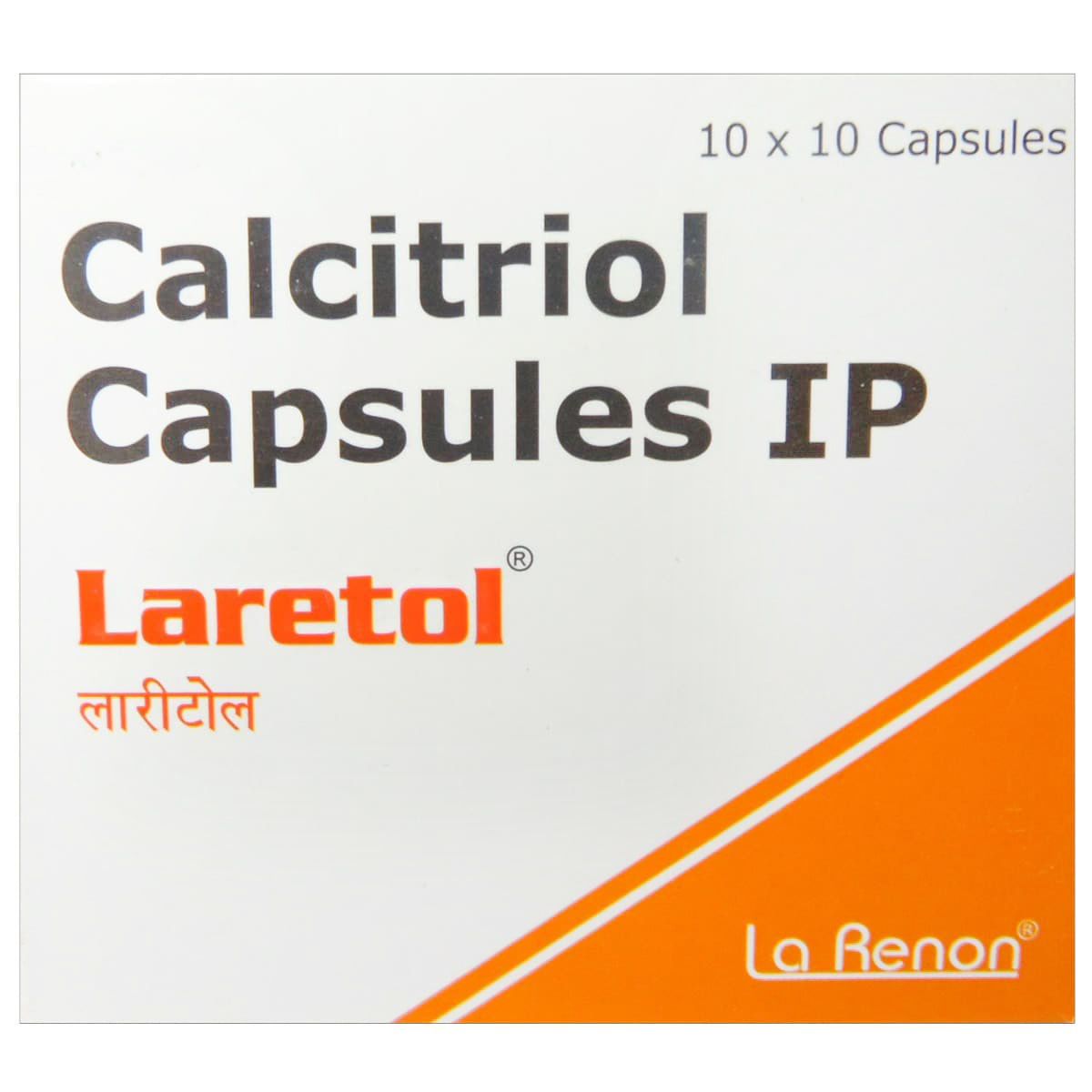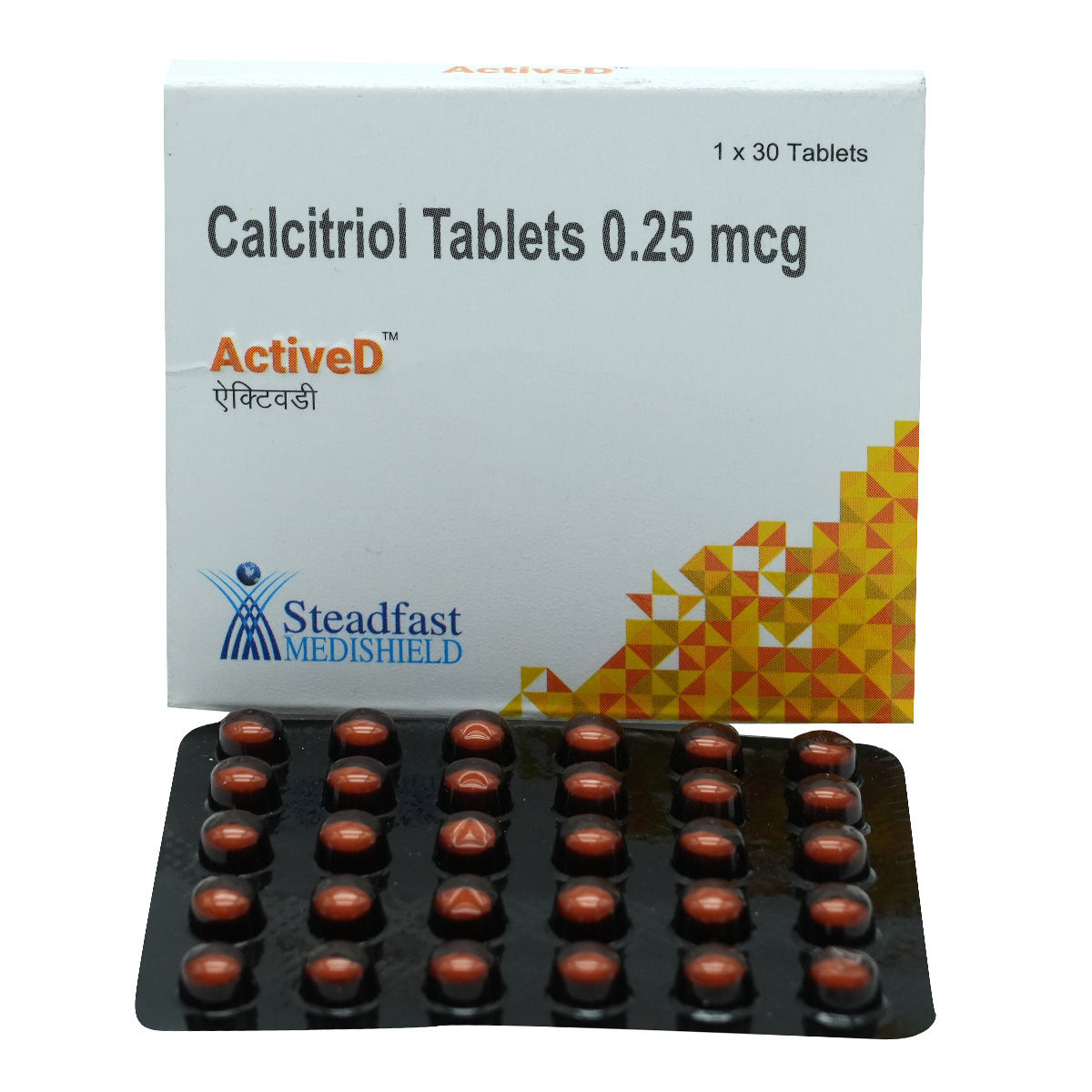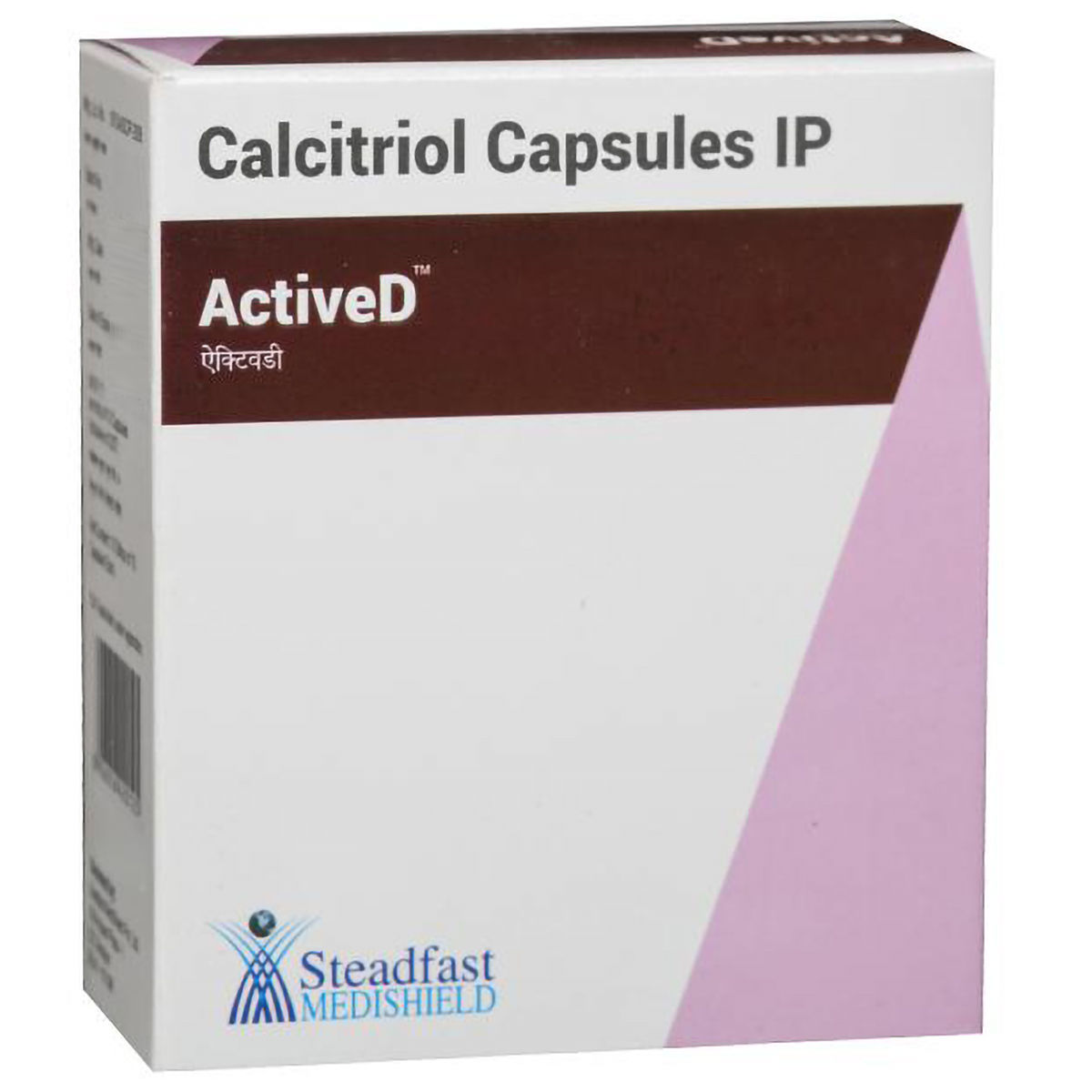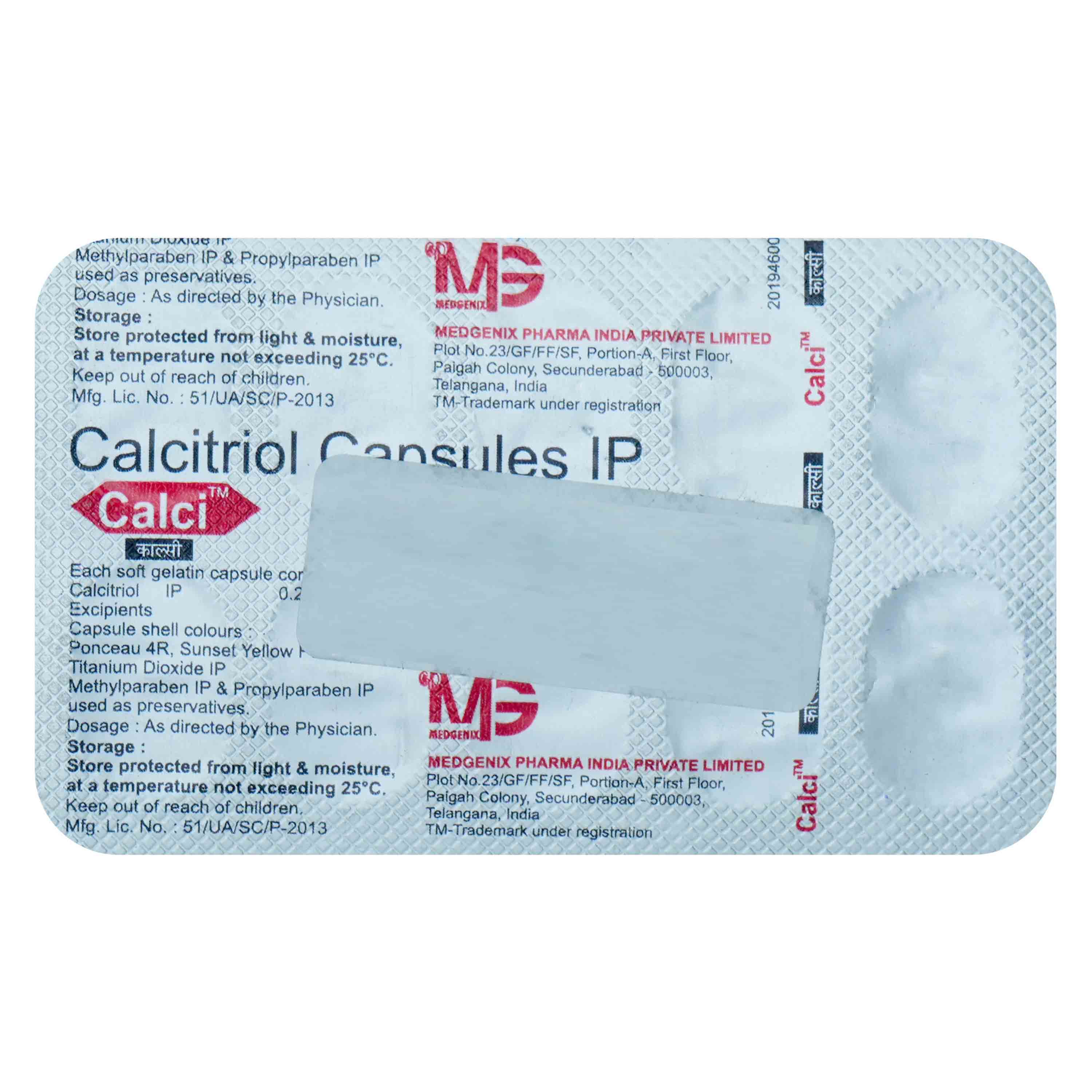About CALCITRIOL+CALCIUM CARBONATE+ISOFLAVONE+MAGNESIUM OXIDE+MENAQUINONE
CALCITRIOL+CALCIUM CARBONATE+ISOFLAVONE+MAGNESIUM OXIDE+MENAQUINONE is a combination medicine primarily used to treat postmenopausal osteoporosis. CALCITRIOL+CALCIUM CARBONATE+ISOFLAVONE+MAGNESIUM OXIDE+MENAQUINONE effectively treats various conditions caused by low calcium levels in the body. Post-menopausal osteoporosis is a condition that develops during the menopause stage, which makes the bones weak and brittle.
CALCITRIOL+CALCIUM CARBONATE+ISOFLAVONE+MAGNESIUM OXIDE+MENAQUINONE consists of Calcitriol (Vitamin D3), Calcium carbonate (mineral), Isoflavone, Magnesium oxide, and Menaquinone (Vitamin K2). Calcitriol is a synthetic version of Vitamin D3 that raises Vitamin D levels and increases calcium levels in the blood. Calcium carbonate is a mineral that provides essential nutrients to maintain bone formation and maintenance. Isoflavone is a soy phytoestrogen or dietary estrogen that treats menopause symptoms and prevents bone loss. Magnesium oxide is a mineral that maintains the normal functioning of muscles and nerves. Menaquinone/Vitamin K2 helps maintain bone density by promoting calcium transport from the bloodstream into the bone.
Use CALCITRIOL+CALCIUM CARBONATE+ISOFLAVONE+MAGNESIUM OXIDE+MENAQUINONE in the dose and duration advised by your doctor. In some cases, CALCITRIOL+CALCIUM CARBONATE+ISOFLAVONE+MAGNESIUM OXIDE+MENAQUINONE can cause side effects like constipation or stomach upset, diarrhea, nausea, vomiting, loss of appetite, mood changes, weakness, tiredness, fast or pounding heartbeat, bone/muscle pain, and headache. Most of these side effects of CALCITRIOL+CALCIUM CARBONATE+ISOFLAVONE+MAGNESIUM OXIDE+MENAQUINONE do not require medical attention and gradually resolve over time. However, if these side effects persist longer, please consult your doctor.
If you are known to be allergic to CALCITRIOL+CALCIUM CARBONATE+ISOFLAVONE+MAGNESIUM OXIDE+MENAQUINONE or its inactive components, please inform your doctor. Please tell your doctor if you have hypercalcemia (high calcium levels), hypervitaminosis D (high vitamin D levels), and malabsorption syndrome (difficulty absorbing nutrition from food) before starting CALCITRIOL+CALCIUM CARBONATE+ISOFLAVONE+MAGNESIUM OXIDE+MENAQUINONE. Brief your medical history if you have any heart/kidney/liver/blood vessel diseases. Pregnant or breastfeeding women should consult their doctor before taking CALCITRIOL+CALCIUM CARBONATE+ISOFLAVONE+MAGNESIUM OXIDE+MENAQUINONE. Please drive or operate machinery with caution if you experience any symptoms that affect your driving ability. Drinking alcohol can affect calcium absorption; hence it is advised to limit the alcohol intake while using CALCITRIOL+CALCIUM CARBONATE+ISOFLAVONE+MAGNESIUM OXIDE+MENAQUINONE.
Uses of CALCITRIOL+CALCIUM CARBONATE+ISOFLAVONE+MAGNESIUM OXIDE+MENAQUINONE
Postmenopausal osteoporosis.
Medicinal Benefits
CALCITRIOL+CALCIUM CARBONATE+ISOFLAVONE+MAGNESIUM OXIDE+MENAQUINONE consists of Calcitriol, Calcium carbonate, Isoflavone, Magnesium oxide, and Menaquinone. Calcitriol is a synthetic version of Vitamin D3 that raises Vitamin D levels and increases calcium levels in the blood. Calcium carbonate provides essential nutrients to maintain bone formation and maintenance. Isoflavone is a soy phytoestrogen or dietary estrogen that treats menopause symptoms and prevents bone loss. Magnesium oxide is a mineral that maintains the normal functioning of muscles and nerves. It also treats low magnesium levels in the blood. Menaquinone, also known as Vitamin K2, helps maintain bone density by promoting calcium transport from the bloodstream into the bone. Calcium-regulating proteins also require it in the arteries.
Directions for Use
Storage
Side Effects of CALCITRIOL+CALCIUM CARBONATE+ISOFLAVONE+MAGNESIUM OXIDE+MENAQUINONE
- Constipation or stomach upset
- Diarrhea
- Nausea
- Vomiting
- Loss of appetite
- Mood changes
- Weakness
- Tiredness
- Fast or pounding heartbeat
- Bone/muscle pain
- Headache
In-Depth Precautions and Warning
Drug Warnings
Let your doctor know if you are allergic to CALCITRIOL+CALCIUM CARBONATE+ISOFLAVONE+MAGNESIUM OXIDE+MENAQUINONE or its inactive components. CALCITRIOL+CALCIUM CARBONATE+ISOFLAVONE+MAGNESIUM OXIDE+MENAQUINONE is not recommended if you have hypercalcemia (high calcium levels), hypervitaminosis D (high vitamin D levels), and malabsorption syndrome (difficulty absorbing nutrition from food). Brief your medical history if you have any heart/kidney/liver/blood vessel diseases, kidney stones, low levels of bile, and phosphate imbalance. Pregnant or breastfeeding women should consult their doctor before taking CALCITRIOL+CALCIUM CARBONATE+ISOFLAVONE+MAGNESIUM OXIDE+MENAQUINONE.
Drug Interactions
Drug-Drug Interaction: CALCITRIOL+CALCIUM CARBONATE+ISOFLAVONE+MAGNESIUM OXIDE+MENAQUINONE may interact with central nervous system stimulants (dextroamphetamine), anti-depressants (duloxetine), anti-ulcer drugs (ranitidine), synthetic thyroid hormone (levothyroxine), painkillers (aspirin), calcium supplements (ergocalciferol), anti-clotting drugs (warfarin), drugs treating high cholesterol levels (cholestyramine), and drugs that treat high blood phosphorus levels (sevelamer). Some medications like tetracycline antibiotics (doxycycline), quinolone antibiotics (ciprofloxacin), drugs treating bone loss (alendronate), weight-loss drugs (orlistat), water pills, and anti-cancer drugs (estramustine) may affect the calcium absorption into the body.
Drug-Food Interaction: Avoid or reduce the intake of caffeine, soft drinks, and alcohol that inhibit calcium absorption.
Drug-Disease Interaction: CALCITRIOL+CALCIUM CARBONATE+ISOFLAVONE+MAGNESIUM OXIDE+MENAQUINONE is not recommended in hypercalcemia, hypervitaminosis D, malabsorption syndrome, and Vitamin D toxicity.
Drug-Drug Interactions Checker List:
Safety Advice

Alcohol
cautionDrinking alcohol can affect calcium absorption; hence it is advised to limit the alcohol intake while using CALCITRIOL+CALCIUM CARBONATE+ISOFLAVONE+MAGNESIUM OXIDE+MENAQUINONE.

Pregnancy
cautionDuring pregnancy, use higher doses of CALCITRIOL+CALCIUM CARBONATE+ISOFLAVONE+MAGNESIUM OXIDE+MENAQUINONE than the daily dietary allowance only when the doctor advises. Your doctor will weigh the potential risks and benefits before recommending CALCITRIOL+CALCIUM CARBONATE+ISOFLAVONE+MAGNESIUM OXIDE+MENAQUINONE.

Breast Feeding
cautionConsult your doctor before taking CALCITRIOL+CALCIUM CARBONATE+ISOFLAVONE+MAGNESIUM OXIDE+MENAQUINONE if you are breastfeeding. CALCITRIOL+CALCIUM CARBONATE+ISOFLAVONE+MAGNESIUM OXIDE+MENAQUINONE may pass into the breast milk. If CALCITRIOL+CALCIUM CARBONATE+ISOFLAVONE+MAGNESIUM OXIDE+MENAQUINONE is used during breastfeeding, please monitor the serum calcium levels of the mother and the infant.

Driving
cautionIf you experience any symptoms that alter your mental ability and focus, please do not drive or operate machinery.

Liver
cautionLet your doctor know if you have any history of liver diseases before taking CALCITRIOL+CALCIUM CARBONATE+ISOFLAVONE+MAGNESIUM OXIDE+MENAQUINONE. Hepatic impairment/liver disease can alter the metabolic and therapeutic activity of certain Vitamin D forms.

Kidney
cautionIt is advised to seek doctor advice before starting CALCITRIOL+CALCIUM CARBONATE+ISOFLAVONE+MAGNESIUM OXIDE+MENAQUINONE if you have kidney diseases like kidney stones or undergoing dialysis. Calcitriol in CALCITRIOL+CALCIUM CARBONATE+ISOFLAVONE+MAGNESIUM OXIDE+MENAQUINONE increases inorganic phosphate levels in serum; hence caution should be taken in patients undergoing dialysis to maintain adequate phosphorus levels and avoid ectopic calcification (calcium deposition).

Children
cautionUse CALCITRIOL+CALCIUM CARBONATE+ISOFLAVONE+MAGNESIUM OXIDE+MENAQUINONE for children only if the doctor has recommended it for your child.
Habit Forming
Diet & Lifestyle Advise
- Include dairy products like milk, yogurt, cheese, or milk-based custard in your diet.
- Eat daily a serving of broccoli, cabbage, bok choy, spinach, and other green leafy vegetables.
- Snack on calcium-rich nuts like Brazil nuts or almonds.
- Sprinkle sesame seeds over your food, vegetables, and salads. Sesame seeds are high in calcium.
- Avoid or reduce the intake of caffeine, soft drinks, and alcohol that inhibit calcium absorption.
- Replace the meat with tofu or tempeh for extra calcium in your food.
Special Advise
- Low phosphate diet is recommended to control serum phosphorus levels in patients undergoing dialysis.
- Clinical monitoring of serum electrolyte concentrations and cardiac function is recommended.
Patients Concern
Disease/Condition Glossary
Post-menopausal osteoporosis is a condition that develops during the menopause stage, which makes the bones weak and brittle.
Osteoporosis is a bone disease that makes the bones weak and brittle by decreasing bone density. It is a silent disease since it is not revealed until a bone is broken easily or fractured. Osteoporosis can be triggered by many factors like age, sex, low calcium diet, hormonal changes, and medical conditions like gastrointestinal diseases, rheumatoid arthritis, certain types of cancer, and HIV/AIDS. Symptoms include backache, easily breaking bones, and hunched or stooped posture. Thinning of bones can be prevented by treating with medications, calcium supplements, a calcium-rich diet, and lifestyle changes.




